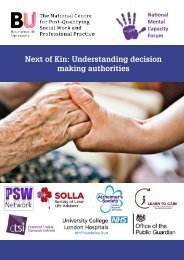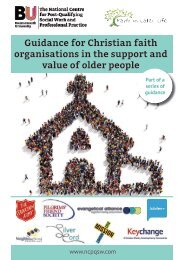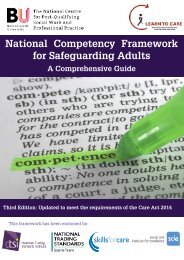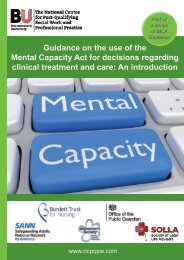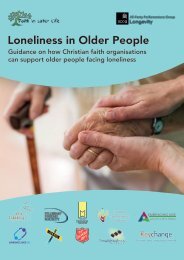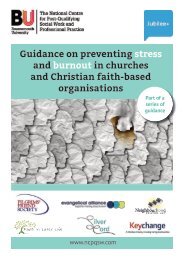Advance Care Planning
Advance care planning is a process that supports adults at any age or stage of health in understanding and sharing their personal values, life goals, and preferences regarding future medical care. The goal of advance care planning is to help ensure that people receive medical care that is consistent with their values, goals and preferences during serious and chronic illness.
Advance care planning is a process that supports adults at any age or stage of health in understanding and sharing their personal values, life goals, and preferences regarding future medical care. The goal of advance care planning is to help ensure that people receive medical care that is consistent with their values, goals and preferences during serious and chronic illness.
You also want an ePaper? Increase the reach of your titles
YUMPU automatically turns print PDFs into web optimized ePapers that Google loves.
Part of
a series
of MCA
Guidance
Advance Care Planning
www.ncpqsw.com
Foreword
The National Centre for Post-Qualifying Social Work and Professional Practice has
produced a series of brief guides to help all health and social care professionals navigate
through and apply the principles of the Mental Capacity Act for decisions regarding
treatment and care. This is one of those guides and should be read in conjunction with the
other guides in the series. These guides can be downloaded for free from www.ncpqsw.com
We trust that these resources will assist all health and social care professionals in
delivering the very best possible care in this difficult time of the Covid 19 response and also
into the future when we get to the other side of the Covid 19 pandemic.
Prof Keith Brown (April 2020)
Director
National Centre for Post-Qualifying Social Work and Professional Practice (NCPQSW)
Centre for Leadership, Impact and Management Bournemouth (CLiMB)
4th Floor Royal London House, Christchurch Road, Bournemouth, BH1 3LT
The new Demystifying Capacity Sage book available to order at
https://uk.sagepub.com/en-gb/eur/demystifying-mental-capacity/
book269861
Set against the backdrop of the Mental Capacity
Act 2005, this book explores and addresses issues
raised by mental capacity within adult safeguarding,
and provides clear guidance on the use and value
of the MCA, and how to ensure that the rights and
choices of individuals are heard, listened to and
acted upon.
With contributions from a range of subject
experts across the legal, social work, nursing and
healthcare disciplines, this book will be invaluable to
practitioners in the health and social care profession,
and indeed any role where issues of mental capacity
may be a concern. Case studies, reflection points
and exercise are used to develop understanding and
support critical engagement with practice.
Introduction
Supporting and encouraging individuals to look forward and consider the treatment and care they
may require in the future is an increasingly important aspect of clinical care – in health and social
care settings. Whether the person is in an acute hospital, community hospital/unit, care home or
receiving care in their own home, practitioners need to be mindful of decisions individuals may
need to make, or have made, regarding future care – for urgent treatments, such as resuscitation,
acute treatments or priorities for end-of-lifecare. At this time of pressures on NHS services, due
to the Covid pandemic, individuals and clinicians are facing difficult decisions at a time of crisis.
Advance Care Planning is therefore even more important at this time – and will continue to be so –
in order to support individuals to make choices and decisions about their future care.
The underlying philosophy of treatment and care, under the Mental Capacity Act (2005), is to
promote person-centred care, in accordance with the individual’s known choices, wishes, values
and beliefs. To this end, the principles of the MCA are to encourage individuals to make their
own decisions wherever possible and to ensure that decisions for those individuals who lack
the capacity to consent to treatment and care are made in their best interests. The MCA aims to
balance an individual’s right to make decisions for themselves with their right to be protected from
harm if they lack capacity to make decisions to protect themselves. Advance Care Planning is
one way in which a person can make known their decisions regarding treatment and care, to be
considered in the future.
What is Advance Care Planning?
Advance Care Planning (ACP) is a way in which individuals can discuss and make clear their
wishes and choices for treatment and care, which may become relevant at a future time, when
they lack capacity to make decisions for themselves. ACP may involve an individual setting out
their decisions regarding choices of treatment and care in documents such as Advance Decisions
to Refuse Treatments (ADRTs) or through Lasting Power of Attorneys for Health & Welfare (LPA)
– both of which are legally binding. ACP may also result in the individual setting out their decisions
and choices regarding future care in Advance Statements of Preferences (ASP), Treatment
Escalation Plans (TEP), Recommended Summary Plan for Emergency Care and Treatment
(ReSPECT) and other forms of advance care plans. ACP may simply involve an individual making
their future wishes known verbally to their family, LPA or health professional involved in their
ongoing treatment and care.
“
Advance care planning is a process that supports adults at
any age or stage of health in understanding and sharing their
personal values, life goals, and preferences regarding future
medical care. The goal of advance care planning is to help ensure
that people receive medical care that is consistent with their
values, goals and preferences during serious and chronic illness.
“
(International Consensus Definition of Advance Care Planning 2017)
Health & Social Care practitioners must be aware of the purpose and usefulness of ACP and the
legal responsibilities they have in considering any wishes or choices and following any ADRT.
They must also support and assist individuals wishing to use ACP and/or their LPA, as a means
of planning their future treatment and care they would wish to receive and making decisions
regarding any medical treatments they would not want to have.
Advance Care Planning – Person-Centred Care
ACP enables personalised care for the future; it can make the difference “between a future in
which a person makes their own decisions regarding their care and a future where others do”
(NICE 2019). By following decisions from ACP, the individual’s wishes and preferences may be
followed; their respect, dignity and personhood may be protected. For people with progressive
conditions, terminal cancer or end-stage long-term conditions, ACP can promote choice and
control over their treatment and care preferences, relevant at a point when their health declines.
Decisions made through ACP can provide peace of mind for their family and confidence to the
clinical team, ensuring that elements of care which are important to the person are known about
and followed (NHS England 2018).
Person-centred care
NICE (2018) recommended that ACP should start as early as possible after a diagnosis of any
life-limiting condition, to enable individuals to make informed choices about their future care. This
is particularly relevant at time of crisis, such as the Covid 19 pandemic, when individuals may be
receiving news of diagnosis which may or may not be life limiting. NICE guidance is clear that
support and advice should be given at the most suitable time, following any diagnosis and then
repeatedly throughout the illness, to allow people to think through and address different issues in
their own time, to make ACP as useful and meaningful for the individual.
ACP becomes even more important in planning for end-stage or end-of-life care for terminal
conditions or frailty. Patients with terminal cancer or progressive long-term conditions should be
supported by healthcare professionals, to set out the care they would wish to have, for the endstages
of their condition – with a range of decisions and wishes recorded to influence future care;
this may include decisions for refusal of certain treatments (ADRT), and the care which may be
provided by other agencies such as social care, family or private carers (ASP). Nurses can play a
vital role in supporting individuals with such planning, going beyond the clinical care and treatment
and helping individuals explore what may be unthinkable (Kay 2016); enabling individuals to make
their own difficult decisions about treatment and care for the end of life, some of whom would be
too frightened to do so on their own. Whilst these conversations are not always easy, this element
of practice should be viewed as a privilege, to enable individuals to influence their future care, be
engaged and involved in decisions and take control of their lives, at a time when little control is left
to them (Kay 2016; Lewis 2019).
Advance Care Planning – The Process
In the Gold Standards Framework (2018), ACP is described as a process which encourages
people to clarify their wishes, needs and preferences for the kind of care they would like to receive,
in relation to the MCA (2005). It provides the means for individuals to clarify:
What is important to me – what
treatments and care the individual
wants to have. These may be
recorded through Advance
Statements of Preferences
(ASP), or discussed with close
family. Although neither would
be legally binding, the person’s
stated wishes, made through a
process of ACP, would have to be
considered in any Best Interest
decisions regarding future care.
What I want to refuse - what treatments the
individual does NOT want to have. These
should be set out in Advance Decisions
to Refuse Treatments (ADRT). They may
include decisions regarding resuscitation,
other emergency and life-saving treatments,
which must be recorded. Valid and applicable
ADRTs are legally binding and have to be
followed by the clinical team, they can only
be overridden by the Court of Protection.
Who will speak for me – A
person’s next-of-kin has no
statutory rights to speak or make
decisions for the individual.
Although the MCA requires
the clinical team to involve and
consult with the family members
of an individual, when the person
lacks capacity to consent to
treatment and care the family
have no automatic right to make decisions (The National Centre for Post-Qualifying Social Work
and Professional Practice 2016). When a person has appointed a Lasting Power of Attorney for
Health & Welfare, the LPA must follow the person’s known wishes and always act in their best
interests. The LPA has the right to consent or refuse treatment on behalf of the individual, when
they lack capacity to make decisions themselves, including decisions regarding life-sustaining
treatments if the person has given this particular power to the Attorney.
(Based on The Gold Standards Framework 2018)
ACP is a voluntary process which sets out a person’s decisions about future care. Many people
will want their family and friends included in the discussion, but it is important that the decisions
regarding future care are in accordance with the choices and wishes of the individual. Whilst
discussions are really helpful, the person should be encouraged to document these decisions for
future care (ASPs) and any refusal for future treatments (ADRTs).
Checklist for supporting people through Advance Care Planning:
Check - has the person already made provision for future decisions?
Think - some people may not want to talk about future care or planning for this.
Remember - everyone is different – their wish for knowledge, autonomy and control.
Be prepared - to explain the purpose and process of Advance Care Planning.
Respect - people may make choices that seem unwise; this does not mean that they
are unable to make decisions or their decisions are wrong.
( B a s e d o n N I C E g u i d a n c e 2 0 1 9 )
Advance Care Planning to Inform Best Interest Decisions
Where an individual is found to lack capacity to consent to care and treatment and there is no LPA
appointed or ADRTs known, the clinical team must make Best Interest decisions for treatment and
care; the MCA requires a consensus of those involved, having considered all relevant information
pertaining to the proposed treatment and the individual person. The MCA Code of Practice
published a statutory checklist for all Best Interest Decisions (Department for Constitutional Affair
2007). This includes the consideration of any known decisions and choices for treatment and care
and legal standing of any Advance Decisions to Refuse Treatments.
The MCA Code of practice makes it clear that a “person’s best interests must be the basis for all
decisions made and actions carried out”. Working out what is in someone else’s best interests
may be difficult, and the Act requires people to follow certain steps to help them work out whether
a particular act or decision is in a person’s best interests. This includes finding out the person’s
views and wishes which may have been “expressed verbally, in writing or through behaviours or
habits”. (Department for Constitutional Affairs 2007). This was firmly supported by Baroness Hale
in Aintree University Hospitals NHS Foundation Trust v James
1, who stated, “The purpose of the
Best Interest test is to consider matters from the patient's point of view” (paragraph 45).
Advance Care Planning to Identify Refusal of Medical Treatments
Decisions to refuse certain medical treatments may have been made by an individual, as part of
ACP. The wishes and rights of the individual are paramount; this applies for refusal of care and
treatment and ADRTs are legally binding (Brown et al. 2015; Kay 2016). The only way ADRTs may
be overridden, is through the Court of Protection.
The MCA Code of Practice (2007) sets out specific responsibilities of clinical practitioners with
regards to ADRTs:
• To check for ADRTs.
• Confirm the validity and applicability of ADRTs.
• If the ADRT is valid and applicable, ensure that the
person’s prior decisions to refuse treatments are followed.
ADRTs must be made when the individual has the mental capacity to make
informed decisions to refuse a treatment. ADRTs for refusal for life-sustaining
treatments must be recorded in writing. They cannot be used to request
or demand treatments, nor can they be used to refuse general care and
treatment such as the provision of food, fluids, personal care (The National
Centre for Post-Qualifying Social Work & Professional Practice 2018).
ADRTs can cause professional dilemmas and disagreements within clinical teams, as the
professional opinion of health staff may be overridden by a valid ADRT to refuse certain
treatments. However, the law is clear that where individuals have made clear statements to
refuse certain treatments through an ADRT, in writing or perhaps verbally to others, at a time
when they had the mental capacity to do so, the clinical team must abide with this refusal of
treatment. Treatment which has been commenced in advance of the discovery of an ADRT should
be discontinued as long as the clinician is happy that the ADRT is “valid and applicable” (see
Advance Decisions to Refuse Treatment - The National Centre for Post-Qualifying Social Work &
Professional Practice 2018).
Your Trust may have policies and guidance for staff on the recording of verbal and written ADRT.
For more information see The National Centre for Post-Qualifying Social Work & Professional
Practice (2018a) and https://compassionindying.org.uk/
Advance Care Planning for Decisions About Emergency Care
The importance of planning in advance for future care and treatment is particularly important for
decisions regarding resuscitation and other emergency treatments. By having discussions when
the individual is able to be involved and informed of emergency procedures, appropriate clinical
decision-making can be recorded clearly, for use if and when the person’s clinical condition
deteriorates and in the event of cardiorespiratory arrest.
Resuscitation status (Do Not Attempt Resuscitation - DNAR) is a clinical decision, made in
advance by the clinical team, on the basis of whether the individual is likely to respond to
cardiopulmonary resuscitation and would benefit from ongoing care for major organ failures in
critical care settings. As with any proposed treatment, the individual’s consent to CPR should be
sought and recorded. Where the person lacks capacity to consent to resuscitation decisions, these
must be made following the MCA Best Interest principles. It is good practice to involve and include
the patient’s family, if appropriate, but the decision remains one to be made on clinical grounds
and recorded by the clinical team. Professionals do need to remember though, that making such
a decision without consultation with family, or people with an interest in the person’s welfare may
well result in a breach of the individual’s rights under Article 8 European Convention on Human
2
Rights .
1
2
[2013] UKSC 67
Winspear v City Hospitals Sunderland NHS Foundation Trust [2015] EWHC 3250 (QB)
Following a report into the outcomes of in-hospital resuscitation, NCEPOD (2012) published
national recommendations for an improved means of recording discussions and decisions relating
to resuscitation and other levels of emergency care. It was recognised that whilst an individual
may not be appropriate for resuscitation, other levels of acute care may be relevant. The term
‘ceilings of care’ was used to define and set out appropriate levels of urgent treatment for an
individual, including resuscitation status. Treatment Escalation Plans (TEP) are commonly used
to record ceilings of care, in hospital and community settings – these include admission to hospital,
use of intravenous therapies, critical care treatments and resuscitation decisions. As part of ACP,
individuals need to be involved with decisions regarding resuscitation and ceilings of care, so that
these may be documented and followed in the event of the patient deteriorating.
ReSPECT (Recommended Summary
Plan for Emergency Care and
Treatment) is a plan setting out the
personal priorities for emergency care
and treatment – including decisions
regarding resuscitation (Resuscitation
Council UK 2019). The ReSPECT
provides details of patient wishes,
with regards to levels of emergency
treatments, to help health professionals
responding to an emergency, to
make immediate decisions about that
person’s treatment. Use of ReSPECT
as part of ACP, will have increasing
relevance for people who have
complex health needs, people who
are likely to be nearing the end of their
lives, and people who are at risk of
sudden deterioration or cardiac arrest
(Resuscitation Council UK 2019).
Although decisions
regarding resuscitation
and ceilings of care
remain clinical decisions,
made by senior clinicians,
individuals need to be
involved with decisions
regarding resuscitation
and ceilings of care.
Individuals wishing to
make advance planning
to refuse life sustaining
treatments, such as
resuscitation, need to
record these through
ADRTs, which will be
followed in the event of
the patient deteriorating.
References
Brown R. Barber P. & Martin D. (2015) - The Mental Capacity Act 2005: A Guide for Practice
Exeter. Sage/Learning Matters.
Department for Constitutional Affairs (2007) - Mental Capacity Act:Code of Practice. London.
International Consensus Definition of Advance Care Planning (2017) – in Sudore R. et al. (2017) – Defining Advance
Care Planning for Adults www.ncbi.nlm.nih.gov/pubmed/28062339
Kay A. (2016) – The ‘perfect’ death. Nursing Older People Vol 28; No.4, pp11
Lewis L. (2019) - Why is future care planning so important for people living with frailty? Nursing Older People Vol 31,
No.1, pp21
Mental Capacity Act 2005 www.legislation.gov.uk/ukpga/2005/9/contents
NCEPOD - National Confidential Enquiry into Patient Outcome and Death (2012) – Time to Intervene: A review of
patients who underwent cardiopulmonary resuscitation as a result of an in-hospital cardiorespiratory arrest
NHS England (2018) - My Future wishes Advance Care Planning for People with Dementia in all care settings
NICE (2018) – Decision making and mental capacity, NICE guideline 108
NICE (2019) Advance Care Planning – A quick guide for registered managers of care homes and home care services,
NICE & SCIE
Resuscitation Council UK (2019) – ReSPECT: Clinicians guide
The Gold Standards Framework (2018) – Advance Care Planning https://www.goldstandardsframework.org.uk/advancecare-planning
The National Centre for Post-Qualifying Social Work & Professional Practice (2016) – Next-of-kin: Understanding
decisions making authorities. Bournemouth University www.ncpqsw.com
The National Centre for Post-Qualifying Social Work & Professional Practice (2018) – Advance Decisions to Refuse
Treatment. Bournemouth University www.ncpqsw.com
Authored by:
Karen Grimshaw, Visting Fellow - Independent Nurse Consultant
Professor Keith Brown, Director of NCPQSW and CLiMB
Designed by:
Caroline Jones, Institute/Centre Administrator
The National Centre for Post-Qualifying Social Work and Professional Practice. Bournemouth University, 4th floor, Royal
London House, Christchurch Road, Bournemouth, BH1 3LT
Copyright © The National Centre for Post-Qualifying Social Work and Professional Practice, Bournemouth University,
April 2020
All rights reserved. No part of this publication may be reproduced or utilised in any form or by any means, electronic
or mechanical, including photocopying, recording or any information or storage or retrieval without prior permission in
writing from the publisher.





